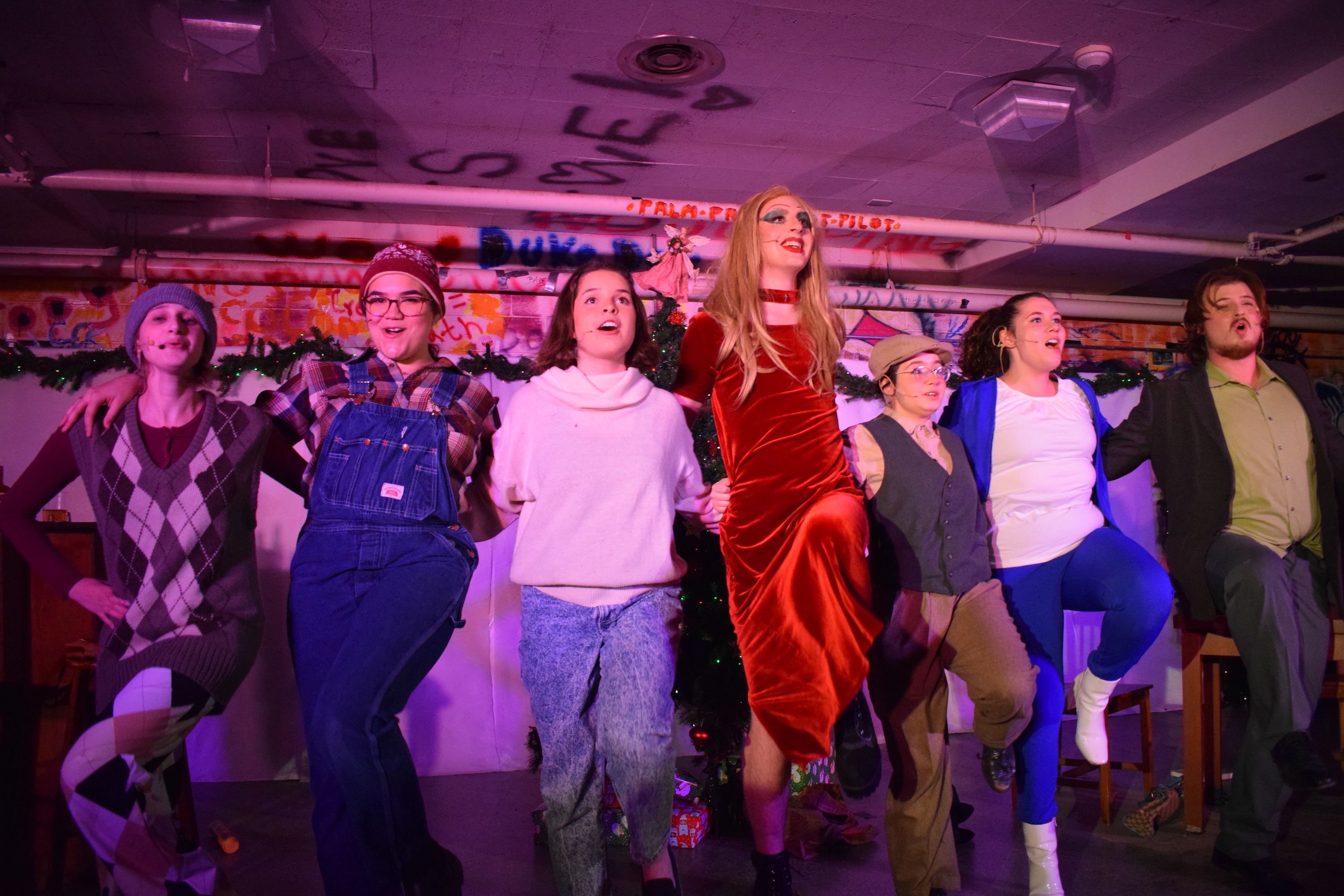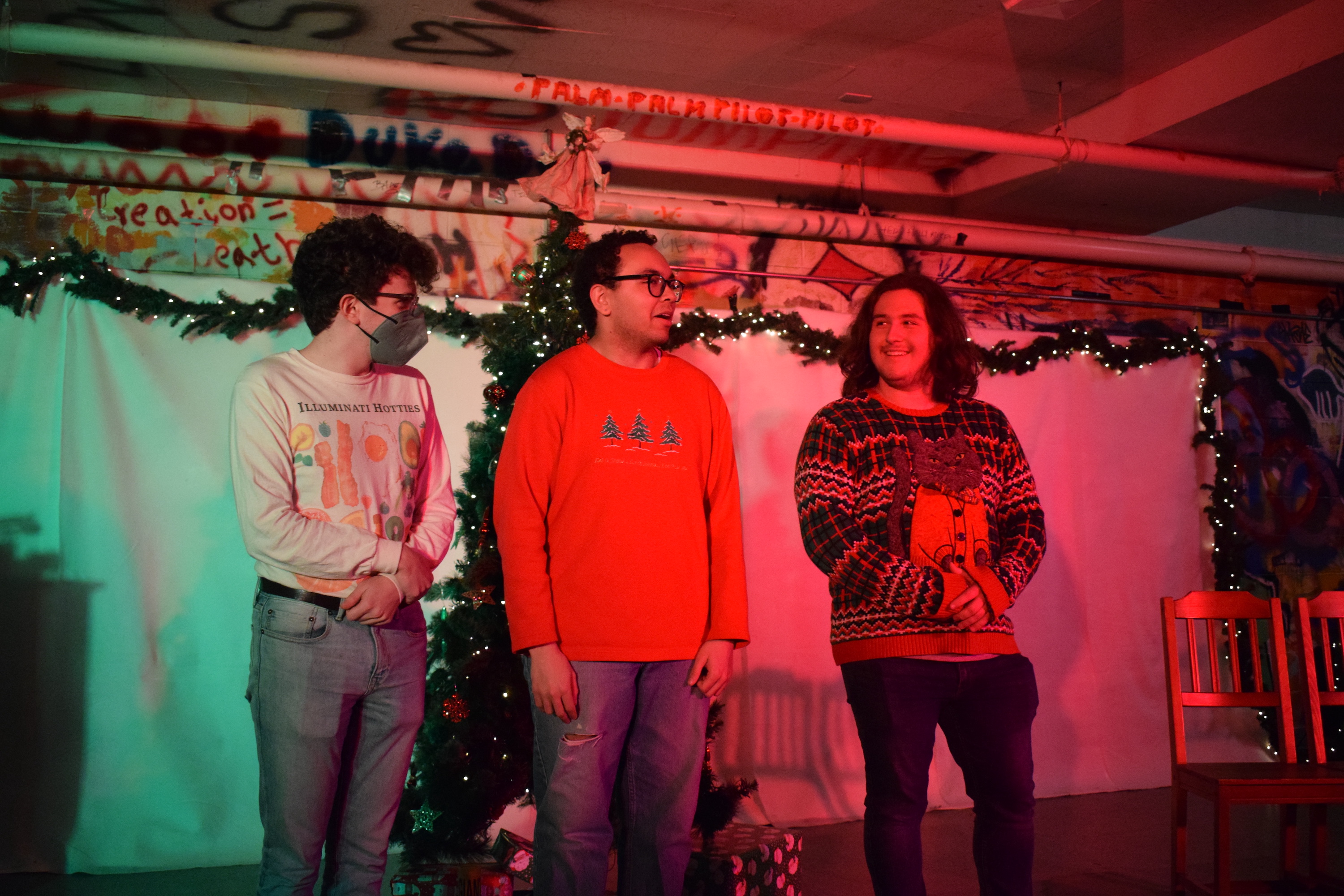
c/o Kyra Kushner
“It’s the 24th night of December, not looking like a Christmas to remember,” sings the cast of “An Untitled Christmas Special,” an original one-act musical written by Luka Netzel ’24 and Vincent Langan ’24, with music and lyrics by Sam Feuer ’23. The show was produced by Spike Tape and performed in the WestCo café on Saturday, Dec. 3 at 5:30 p.m. and 8 p.m.
This refrain establishes the holiday disillusionment felt among the cast of characters stranded in a small Minnesotan town during a blizzard. The musical, complete with 10 original songs composed by Feuer, features twinkling lights, endearing moments of tension thawing between strangers, and a series of sharp-witted jokes poking fun at popular culture. The show intentionally doesn’t take itself too seriously, yet the range of emotions conjured around Christmastime rings true.
Timmy Tinselton, an unfailingly optimistic young orphan played by Zoë Holbo ’24, continues to believe in the magic of Christmas despite being surrounded by disaffected adults snowed into an inn. There’s Marilla LaBelle (Sarah Linsly ’24), a relentless businesswoman and aspiring She-E-O who cannot make time for her family in the midst of work calls and meetings, Harold Witherbeans (Max Levy ’24) a down-in-the-dumps alcoholic businessman who has missed too many milestones in his children’s lives because of work travel, and Keith Dunham (Amina Mednicoff-Misra ’24), a late-blooming bartender who moved out of his parents’ house at the tender age of 26 and feels stuck in a small town with no horizons. Midwest mom Freiba Foosey-Jones (Charlotte George ’24) sings about being forlorn and forgotten with her kids grown up and her husband always working, and Benji Brown (Abrielle Belisle ’25) desperately wants a girlfriend and fears being alone forever.
All these characters and each of their woes come together into what begins as a pity fest but by the end of the show becomes a celebration of optimism.
“The holidays bring out a certain brokenness in adults,” Langan said. “Christmas movies and Christmas media do a really great job of bringing us comfort for the season. But what happens when that script we’ve seen 100 times doesn’t work out? Or when there’s a certain moment where things shift, like [with Freiba] when the jolly happy mother facade withers away? What happens to our holiday cheer when we don’t have these things to fall back on? Luckily for these characters, they have a little orphan boy with an indomitable Christmas spirit. That’s something that we really wanted to investigate with our show.”
Indeed, the show deconstructs Hallmark Christmas archetypes to craft a narrative in which traditional characters are explored in a new way. As each character interacts with Timmy and shares their grievances with the holiday season, it becomes more and more doubtful whether these characters will find joyful tidings. The real hero of the show is drag queen and fairy godmother Margarita Johnson (Miles Allen ’24), who rallies everyone’s spirits in time to deck the halls. The secret to Christmas cheer? The mysterious jingle jangle juice, actually a metaphor for hope and finding joy in life’s small moments.
“I think we just want people to walk away with a little holiday cheer, no matter what they celebrate,” Netzel said. “The goal was just to show what makes people happy and to have fun.”
Langan and Netzel first conceived of the show after finishing their work on the play “Horse Girls” in the spring. They spent the summer fine-tuning their idea and brought Feuer onto the project at the start of the semester to write the music. The team spent many a late night holed up in Low Rise working on the show until finishing writing it in October and immediately beginning rehearsals.
Feuer, who admits to not knowing much about Christmas because he was raised Jewish, spoke about the process of writing music for the show.
“If anyone knows anything about Christmas music, it’s that Jews write all of the good Christmas music,” Feuer said. “I just wanted to help out my friends. I haven’t been involved in a musical in a few years, and I’ve never had the opportunity to write a whole musical, so I thought it would be a good challenge.”

c/o Kyra Kushner
Sometimes Langan and Netzel sent Feuer lyrics to add music to. Sometimes Feuer wrote the music first, and then the trio worked together to come up with lyrics.
“Every time, we just had to think of a general idea for the song,” Feuer explained. “Once we did, I feel like most of the songs came together pretty quickly. It’s just that thinking of that idea, that guiding light for each of the songs, was difficult sometimes.”
Netzel emphasized how incredible it was to be able to work on this show with close friends, especially while navigating the creative process and all the hours spent writing and revising the script and songs.
“The reason that the show works is because of the connection that’s already between us,” Netzel said. “Vincent and I have written together before. We have a very similar sense of humor. There are some points where it’s very clear if something is Vincent’s voice or if it’s my voice or if it’s some combination of us. But because we’ve written together and we know how our flow works, it was very easy to bang out a scene and then just give Sam lyrics to work with. I think Sam was really adept to chime in and give something great when we were arguing about writing a scene or arguing about a joke.”
Feuer echoed how important their collaboration as friends was for the success of the show.
“If I wasn’t working on this with some people who I really respect and generally adore then I wouldn’t have been able to do this, because it was a lot of work,” Feuer said. “I was like, “Oh, there’s never any way that it’s going to work out in time, or there’s no way that it’s going to work out at all.’ Luckily, I was working with at least one raging optimist who told me that actually I could do it. The support that you get from your friends, you cannot deny how important that is.”
Langan expressed that the songs from the show have been stuck in his head for the past month as the show slowly came to life on stage during rehearsals.
“That’s the feeling we’re trying to capture, something that stays with you and something that you’re always discovering something new about,” Langan said. “That’s how I feel about the script. Even though we wrote it, I’m always finding little lines and little moments where I had no idea that these characters could feel this way together at the same time. It’s a very beautiful thing. This is one of the things I’m the most confident in ever having created, like, I made my dad cry. That just made me so happy just to see that it touches someone when the holidays get so crazy and existentialist.”
The show’s crew also played a huge role in bringing the holiday magic alive. A Christmas tree took central stage, with different colored lights changing in pattern with the music and dialogue throughout the production.
“I really want to shout out our lighting designers [Claire Edwards ’24 and Sophia Flynn ’25],” Netzel said. “They made some really funny bits and jokes just through the lighting. There’s little moments where our set designer [Henry Owens ’25] had ideas with how the actual tree on stage is lit. There are just little moments and things in the background where it heightens a joke or just creates an entirely new joke that we wouldn’t even thought of. Everyone working on this not only enjoyed what we wrote and then performing it, but they also added something that none of us could have thought of. That’s just what makes it such a beautiful process.”
In the end, the creators simply sought to make people laugh and consider who and what they hold dearest in their lives.
“An important part of the play is that the drag queen character comes in at the end and saves the day,” Langan added. “The play ends with the little boy giving this drag queen a hug. There’s a horrible moment in our country right now of vilifying people for being themselves. And I think our show is not political in nature, but I think it just shows how freeing it can be to just sing and dance and discover that there’s so much joy that we have yet to realize in our lives.”
Rachel Wachman can be reached at rwachman@wesleyan.edu.